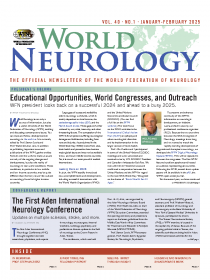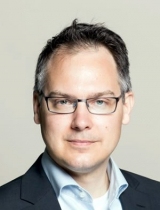Document Download: World Neurology - January 2025

Description:
World Neurology: January 2025, Volume 40, No. 1
Published: 14 Jan 2025
Published by Ascend Integrated Media LLC, Kansas, USA
From the editors
Steven L. Lewis, MD, Editor, and Walter Struhal, MD, Co-Editor



Educational Opportunities, World Congresses, and Outreach
Welcome to the January/February 2025 issue of World Neurology, the first issue of this new year. In this issue's President's Column, World Federation of Neurology (WFN) President Prof. Wolfgang Grisold chronicles important 2024 WFN events and provides an outlook for some of the many exciting plans for 2025.
Drs. Raelle Tagge, Lilyana Amezcua, and Bruce Ovbiagele provide an introduction to the U.S.-based Society for Equity Neuroscience (SEQUINS), which is dedicated to enhancing equitable neurological care and outcomes via research.
This issue also includes two reports from young neurologists who participated in important experiences organized through the WFN. Dr. Aïssata S. Touré, a neurology resident from Mali, reports on her month-long neurology department visit to Dusseldorf, Germany, supported by the German Neurological Society (DGN). The WFN thanks the DGN for providing this wonderful opportunity for young neurologists from low- and lower-middle income countries from Sub-Saharan Africa. Dr. Bermet Nurbekova, a young neurologist from Bishkek, Kyrgyzstan, reports on her attendance at the 15th European Epilepsy Congress. Her attendance to the congress held last September in Rome, Italy, was made possible through her WFN Junior Traveling Fellowship.
This issue also includes the announcement that Prof. Raad Shakir, a past president of the WFN, has been appointed as president of the Joint Neurosciences Council (JNC) UK, effective Jan. 1, 2025. The JNC UK is the umbrella organization for 18 neurosciences specialty associations. The WFN congratulates Prof. Shakir on this important appointment. In this issue's History Column, Dr. Peter Koehler delves into the topic of headache and migraine as it was recognized in the time of Shakespeare, and as reflected in his work.
Dr. Aussan Al-Athwari reports on the first Aden International Neurology Conference (ANC) that occurred in December 2024 and brought more than 400 participants to Yemen to discuss updates in the field of neurology. Prof. Lewis, editor of World Neurology, was privileged to participate in this seminal conference. We congratulate the organizers for hosting this conference for the region.
This issue also includes an obituary for Prof. Stephan Zierz. Written by Drs. Benedikt Schoser, Jan Kuks, and Marianne Devisser, the article details Prof. Zierz's profound impact on the field of neurology and neuromuscular medicine.
We thank all neurologists and neurologic trainee readers in all regions of the world for your interest in the WFN and in World Neurology. We look forward to your contributions to this publication in 2025. •
Highlights
President's Column
-
Educational Opportunities, World Congresses, and Outreach ⧉
By Wolfgang GrisoldWorld Neurology is not only a source of information, but also a useful chronicle of the World Federation of Neurology (WFN), tackling and discussing contemporary issues. You can trace and follow developments in neurology in the archive. It is currently edited by Prof. Steven Lewis and Prof. Walter Struhal, who, in addition to publishing important news and publications of the WFN, gather articles from all over the world to make us aware not only of the ongoing changes and developments, but also the reality of neurology in real-world conditions.
From WFN
- A first-time attendee presents at the European Epilepsy Congress ⧉
By Bermet NurbekovaI am deeply grateful for the Junior Traveling Fellowship Grant provided by the World Federation of Neurology (WFN), which enabled me to attend the 15th European Epilepsy Congress. There, I presented my abstract, titled "Convulsive Syndrome First Aid: A Comparative Analysis of Dental and General Medicine Faculty Students' Knowledge."
In Memoriam
- Prof. Stephan Zierz (1954-2024) ⧉
By Benedikt Schoser, Jan Kuks, and Marianne De VisserStephan Zierz, a pioneer in the field of neurology and neuromuscular medicine, was born on July 20, 1954, in Heidelberg, Germany. His father, Prof. Paul Zierz, was a well-known figure in the German Dermatological Society.
Around the World
- An Exchange of Neurological Ideas ⧉
By Aïssata S. TouréI had the opportunity to visit the University Hospital of Dusseldorf Nov. 11-Dec. 5, 2024, thanks to a training grant provided by the German Neurological Society and the World Federation of Neurology (WFN). This was a unique training opportunity, which allowed me to experience the neurology field in a high-level setting with well-trained physicians. I have seen several patients with different neurologists, allowing me to learn from different views and angles. Over a period of one month..
- Impact Through Insight ⧉
By Raelle Tagge, Lilyana Amezcua, and Bruce OvbiageleNeurological conditions are now the most prominent cause of ill health and infirmity worldwide.1 This sobering development occurs in a setting where the global burden of neurological disease is unevenly distributed, disproportionately impacting certain minority ethnic and racial backgrounds, as well as those from lower socioeconomic groups or residing in medically underserved regions.
- The First Aden International Neurology Conference ⧉|
By Aussan Al-Athwari, MDThe conference, which was held Dec. 18-19, 2024, was organized by the Aden Neurology Advisory Board (ANAB). Prof. Riadh Gouider, co-chair of the World Federation of Neurology (WFN) Education Committee, attended the opening ceremony and presented a report on the latest guidelines from the Middle East North Africa Committee for Treatment and Research in Multiple Sclerosis (MENACTRIMS).
History
- Headache and Migraine in Shakespeare's Work ⧉
By Peter J. KoehlerEnglish playwright and poet William Shakespeare (1564-1616, see Figure 1) was born in Stratford-upon-Avon and is known as the "Bard of Avon." He wrote a vast body of work that includes no fewer than 39 plays and 154 sonnets.
Recognitions
-
Prof. Raad Shakir Appointed JNC President ⧉
Prof. Raad Shakir, past president of the WFN, has been appointed president of the Joint Neurosciences Council (JNC) UK, effective Jan. 1, 2025. The JNC is the umbrella organization for 18 neurosciences specialty associations in the UK, including neurology, neurosurgery, psychiatry, neurophysiology, neuroradiology, neuropsychology, and neuropathology.







